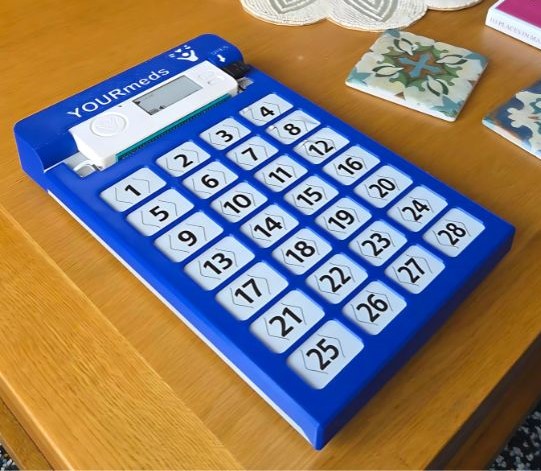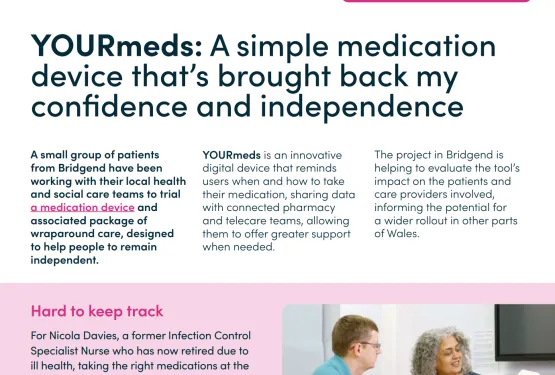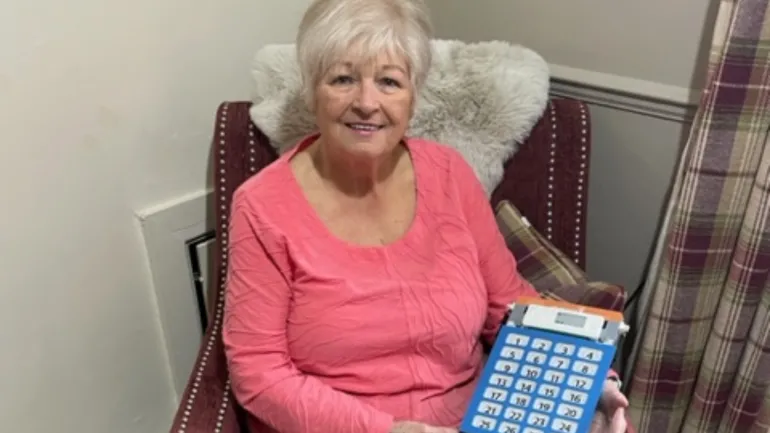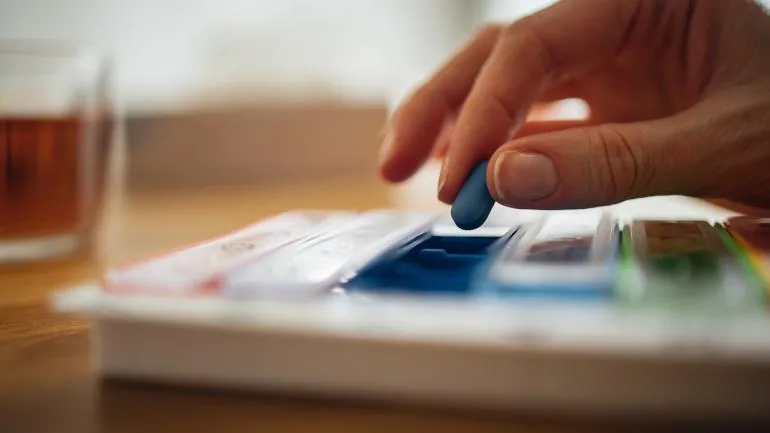A small group of patients from Bridgend have been working with their local health and social care teams to trial a medication device and associated package of wraparound care, designed to help people to remain independent.

YOURmeds is an innovative digital device that reminds users when and how to take their medication, sharing data with connected pharmacy and telecare teams, allowing them to offer greater support when needed.
The project in Bridgend is helping to evaluate the tool’s impact on the patients and care providers involved, informing the potential for a wider rollout in other parts of Wales.
Hard to keep track
For Nicola Davies, a former Infection Control Specialist Nurse who has now retired due to ill health, taking the right medications at the right time had become an increasingly complex challenge. With multiple health conditions requiring a complicated mix of different medications to be taken at different points throughout the day, it was easy to get muddled about what had been taken when.
Due to her conditions, which include fibromyalgia and chronic pain, Nicola suffers from severe fatigue and unconventional sleeping patterns. As a result, doses were being missed or taken at the wrong time of day.
“My big issue is fatigue”, says Nicola. “I can literally go to sleep while I’m eating or drinking, glass in hand. And once I’m asleep I’m dead to the world, so it can make it very hard to keep track of things.
“I had my own pill box, but I was getting so tired... I’d start to lay the drugs out and then fall asleep. I didn’t trust myself to have put things in the right place.”
Nicola’s medications include some strong painkillers and other dangerous drugs (including Dabigatran to prevent blood clots, which has to be taken within a strict six-hour window). Not taking her medication properly was leading to negative side effects and meant Nicola’s conditions were not being managed well. It was also leaving her vulnerable to accidental overdose.
Keen to find a way to support Nicola, the Community Medicines Optimisation Team suggested she join the pilot for YOURmeds, knowing they would benefit from her personal feedback plus her wider knowledge of the challenges around medication management as a former nurse.
Restoring confidence and improving wellbeing
The YOURmeds device features a numbered blister pack that slides into a digital device called a tag. The blister pack is filled with rounds of medication by community pharmacists and delivered directly to users. The digital tag then reminds users when to take their medication, and sensors in the blister pack detect when the medication has been accessed. If medication is missed, alerts can be sent to the user.
Nicola says using this new system has made a huge difference.
“Alarms go off when I need to take things, and now if I’m confused, I can just check my messages and see whether I’ve taken what I should have done. I’ve got more control and it’s given me my confidence back.”
Avoiding errors and maintaining independence
As well as the user reminders, the ability to send alerts to family members and/or a Telecare Alarm Receiving Centre means that medication issues can be escalated and wider support can be provided.
While Nicola has found it sufficient to receive the alerts herself, she thinks this additional support could be very useful for some people looking to maintain their independence, including people in the early stages of dementia, and elderly people who want to live longer in their own home.
Tom Sauter, the Clinical Lead Pharmacist involved in the project agrees, having seen how helping people to manage their own medication is improving health and wellbeing, avoiding the need for additional carers and reducing the number of medication-related emergencies.
“The remote monitoring aspect is important as it enables families and services to further support individuals and prevent potential hospital admissions.”
The right meds at the right time
The medicines optimisation team had to do a bit of adjusting at the start to find a medication routine that would fit with Nicola’s waking patterns.
“I tend to be awake more in the evenings, but dead to the world in the mornings. So we worked together to change the timings. I now have my first dose of the day at noon instead of 9am. It’s been good to have that flexibility.”
Nicola says her family have noticed the difference in how she’s coping.
“My brother and sister would come in before and always try and check that I’d filled up the pill boxes properly. It’s a big relief to them to know that they don’t need to worry so much now.”
Nicola is no longer regularly missing doses and she’s found it easier to take her medications at more consistent times. This ensures her treatment has the optimum chance of working to ensure Nicola is getting the most benefit.
“I never realised there was anything like this out there”, she says. “So it’s great to think this will be open to more people to use. Because there are lots of people like me who are more than capable of taking their medication, but it’s just a confidence thing.”
Learn more about the YOURmeds project and partners here.



